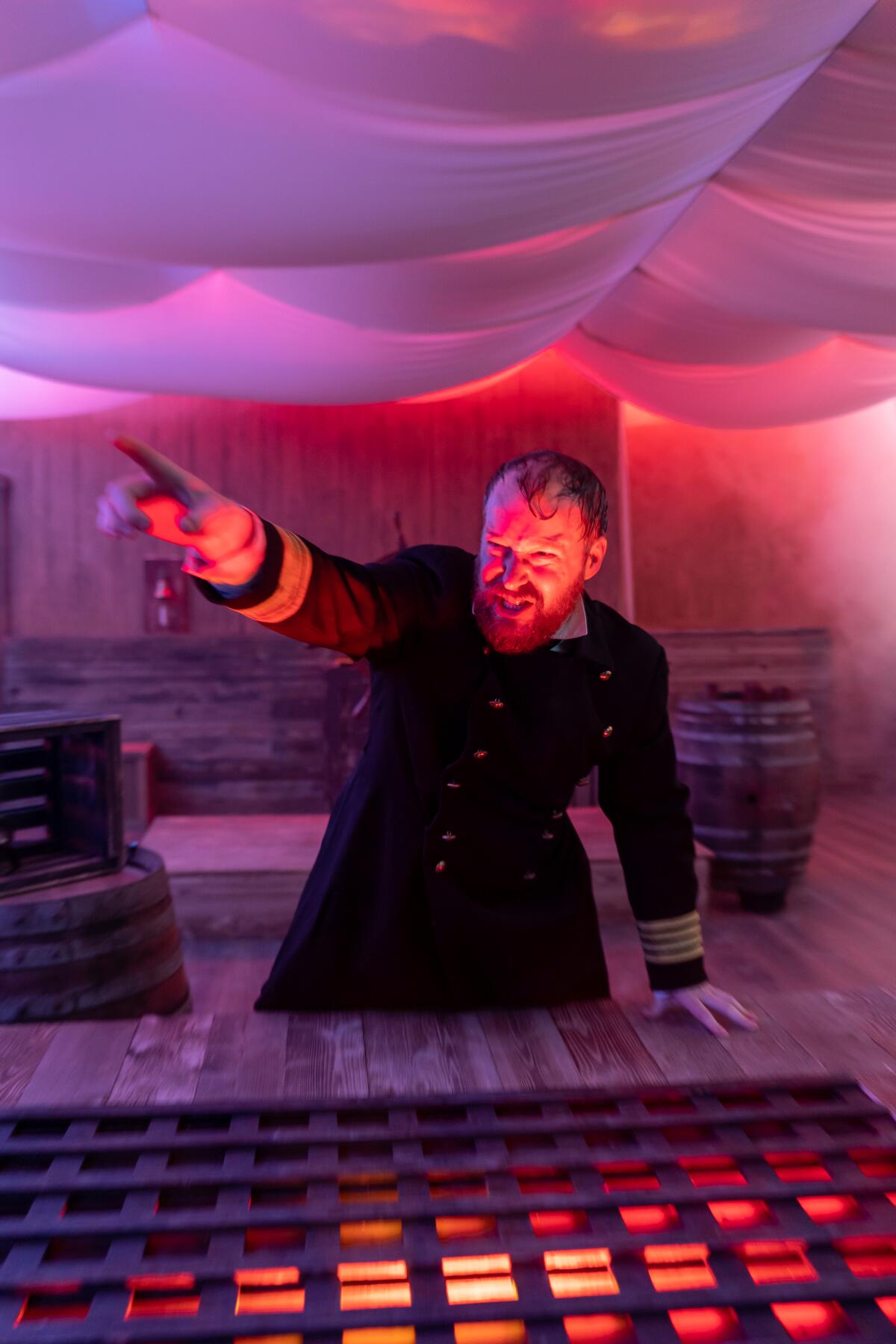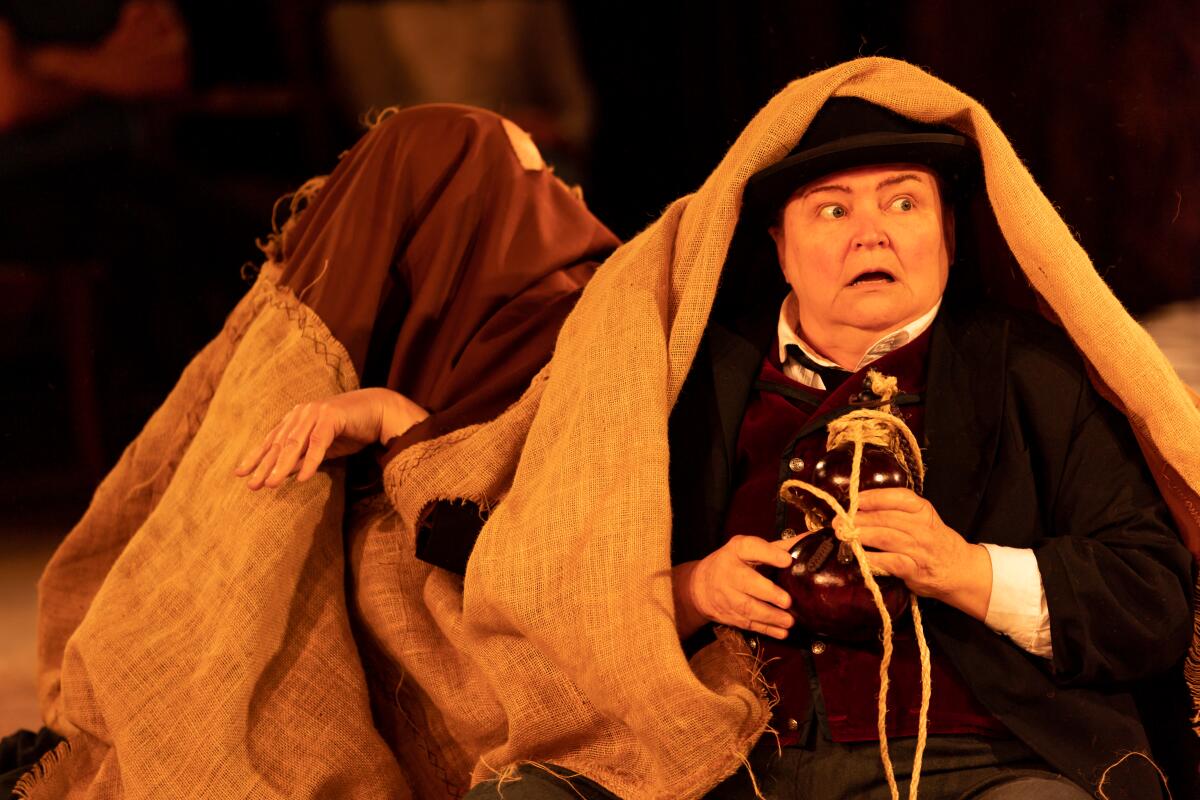Review: Words aren’t the only magic in this interactive production of Shakespeare’s ‘Tempest’

- Share via
You’ll have to board a ship if you wish to see the new production of “The Tempest” at the Shakespeare Center of Los Angeles. Audience members are issued boarding passes for their return trip to Italy, joining the royal swells as they make their way back from Tunis, where they celebrated the marriage of the daughter of Alonso, king of Naples.
Readers of Shakespeare’s late romance will remember that this ship runs into a tempest that disgorges its passengers onto a strange island in the middle of nowhere. Here, Prospero and his daughter, Miranda, have made their home for 12 years, ever since Prospero’s conniving brother, Antonio, conspired to steal his dukedom.
This collaboration between the Shakespeare Center of Los Angeles and After Hours Theatre Company is a hybrid offering. Subtitled “An Immersive Experience,” the production begins in an interactive mode, with groups of audience members invited to mill about the ship, experience the catastrophic effect of the storm and explore some of the sights of the island once we’re washed ashore.

My immersive tour included some friendly banter with one of the more rascally shipmates and a visit to the grave of Sycorax, the witch who was exiled to the island, where she “littered” monstrous Caliban and tormented the gentle spirit Ariel. I also poked my head in a few huts, but the Instagram hordes prevented me from investigating what was inside. (No, not even Prospero’s island is a selfie-free zone anymore.)
Theatergoers then take their seats for a more traditional revival. The sit-down portion of the play begins with Miranda grieving the shipwreck that we’ve all just experienced for ourselves. Prospero explains that the tragedy is an illusion under his command. The stars aligned for him to deploy his formidable magic to right the wrongs that left them stranded on a desert island.
Content to live a life of secluded study, he has decided to act for the sake of Miranda’s future. The prospect of revenge is not incidental, but it’s tempered by the value of forgiveness, which he recognizes even if he’s unable to forget the treachery that forced him and his daughter to flee Milan.
In the central role of Prospero, Chris Butler emphasizes the storm blowing inside the character’s mind. His interpretation is a far cry from the melancholy old magician who intones Shakespeare’s poetry with the grave solemnity of John Gielgud, who put his indelible stamp on the role. The hint of Southern fury in Butler’s voice suggests a Prospero closer to home.
Bitter experience has engendered authoritarian impulses in Prospero. He works to keep them in check, but Shakespeare illustrates in this character the way righteous indignation can flirt with despotism.
A seething Prospero is completely understandable, but some of the music of Shakespeare’s wordplay gets lost in the hostility. When Butler’s Prospero refers to Miranda as “a third of mine own life” while bestowing her on Ferdinand, he seems more resentful than beneficent. (Harriet Walter’s Prospero balanced wrath with verbal rapture in her mesmerizing performance in an all-female production.) Still, Butler’s sheer ferocity and ruthless unsentimentality make for a bracing update.
“The Tempest” is fascinated by the dangerous allure of power. Violent rebellion is in the air. The play recognizes that politics can’t be divorced from the flaws in our psychological makeup, but since perfect human beings don’t exist, the best we can do is learn from our mistakes and move forward accordingly.
Ben Donenberg, the artistic director and founder of Shakespeare Center of Los Angeles, meets “The Tempest” with a 21st century cast in a revival that doesn’t treat the play as allegory. Instead, he allows political interpretations to arise through the particular qualities and life experiences of his actors. The approach is pluralistic. Ideas are welcomed without an overriding ideological agenda.
Caliban, Prospero’s malformed lackey, has been reclaimed by postcolonial critics as an example of an oppressed “other,” an enslaved man whose dignity has been denied by European imperialists. The character is indeed oppressed, but he is also an invasive presence on the island — a native by dint of his mother’s banishment who would himself be conqueror, given half a chance. His malevolence can’t be undercut without losing sight of his attempted rape of Miranda.
Wayne T. Carr, wearing a lumpy costume by designer Dana Rebecca Woods that slips past existing taxonomies, doesn’t play down the character’s sinister machinations. But he finds a complicated dignity in Caliban’s language, which has moments of surpassing beauty.
The redemption is subtle, implicit and not at odds with the drama. Indeed, this “savage,” as Shakespeare took pains to note in his complicated depiction of Caliban, is a good deal more civilized than the drunken riffraff with whom he falls into cahoots.
Trinculo (Daniel T. Parker), a jester, and Stephano (K.T. Vogt), a royal butler, have reunited on the island in Caliban’s company. They are characterized in costume and farcical manner as Tweedledum and Tweedledee. Caliban gives these fellows the idea of killing Prospero and taking over the island, but they quickly reveal themselves to be his moral inferiors.

The comedy of their scenes is more physical than verbal, but Vogt and Parker’s intrepid slapstick doesn’t solve the problem of their largely impenetrable banter. (This section of “The Tempest,” linguistically lost to modern audiences, cries out for fearless adaptation.)
At the heart of “The Tempest” is a love story, and Ulato Sam deserves praise for his princely portrayal of Ferdinand, heir to the throne of Naples, who many in the royal party assume has died at sea. Miranda (a refreshing Kay Sibal) is smitten instantly — and no doubt she is as seduced by his beautiful eloquence as she is by his gracious manners and good looks.
Shakespeare’s power as a dramatist is at its zenith when actors find their characters in the rhythm and meaning of their lines. Once again, Peter Van Norden raises the bar. Last year he delivered a lip-smacking Polonius in the Antaeus Theatre Company production of “Hamlet.” This time he gives life to a more endearing dispenser of moral wisdom in Gonzalo, faithful counselor to Alonso (Leith Burke) and the friend who aided Prospero in his escape after his dukedom was lost.
Van Norden — a local Shakespearean treasure — makes Gonzalo honorable yet not entirely immune from the ridicule of Antonio (Rodney Gardiner), Prospero’s brother, and Sebastian (Christopher Rivera), Alonso’s brother, who are plotting their own vicious coup. If these villains had Van Norden’s verbal dexterity, their cynical mischief would be not just funnier but also more chilling.
But words aren’t the only magic in this production. One of the most moving sounds that is heard is the long exhalation of Jin Maley’s Ariel after Prospero sets this attending spirit free. No song that is set to composer Michael Roth’s otherworldly music has the impact of this poignant sigh of relief.
The Shakespeare scholar Anne Barton observed that “The Tempest” “compels a peculiarly creative response.” The element of sorcery and the special effects it conjures, along with the array of personages, human and supernatural, and the compact nature of the plot and poetry, encourage not just directorial freedom but experimental wackiness. No play of Shakespeare’s seems to inspire so much risk-taking.
The interactive dimension of this revival sets up logistical complications that can leave a gimmicky impression (despite the attractive immersive design of Sara Beil). But beyond creating the sense of “event” that theater seems to need these days, the immersive introduction helps transport the audience to a different state of consciousness — and so there’s value beyond trendiness.
The play’s ending is profoundly stirring, and this production beautifully realizes the emotional power of Prospero’s reconciliation scene. Butler doesn’t so much soften his Prospero as he expands his vision. The happy resolution is earned by more than hocus-pocus. Rancor and resentment are never out of view, but trust is renewed as innocence and experience bravely embark on a new journey.
‘The Tempest: An Immersive Experience’
Where: Shakespeare Center L.A., 1238 W. 1st St., L.A.
When: 7 p.m. Thursdays-Saturdays, 2 p.m. Saturdays-Sundays. (Check for staggered start times.) Ends April 16.
Running time: 2 hours, 30 minutes
Tickets: $49-$129 (subject to change)
Info: tempestla.org
More to Read
The biggest entertainment stories
Get our big stories about Hollywood, film, television, music, arts, culture and more right in your inbox as soon as they publish.
You may occasionally receive promotional content from the Los Angeles Times.











